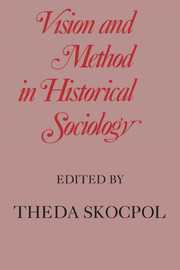Book contents
- Frontmatter
- Contents
- Preface
- 1 Sociology's Historical Imagination
- 2 The Social and Historical Landscape of Marc Bloch
- 3 Beyond the Economistic Fallacy: The Holistic Social Science of Karl Polanyi
- 4 Configurations in History: The Historical Sociology of S. N. Eisenstadt
- 5 Theoretical Generalization and Historical Particularity in the Comparative Sociology of Reinhard Bendix
- 6 Destined Pathways: The Historical Sociology of Perry Anderson
- 7 E. P. Thompson: Understanding the Process of History
- 8 Charles Tilly's Collective Action
- 9 The World System of Immanuel Wallerstein: Sociology and Politics as History
- 10 Discovering Facts and Values: The Historical Sociology of Barrington Moore
- 11 Emerging Agendas and Recurrent Strategies in Historical Sociology
- An Annotated Bibliography on Methods of Comparative and Historical Sociology
- Notes on the Contributors
10 - Discovering Facts and Values: The Historical Sociology of Barrington Moore
Published online by Cambridge University Press: 05 June 2012
- Frontmatter
- Contents
- Preface
- 1 Sociology's Historical Imagination
- 2 The Social and Historical Landscape of Marc Bloch
- 3 Beyond the Economistic Fallacy: The Holistic Social Science of Karl Polanyi
- 4 Configurations in History: The Historical Sociology of S. N. Eisenstadt
- 5 Theoretical Generalization and Historical Particularity in the Comparative Sociology of Reinhard Bendix
- 6 Destined Pathways: The Historical Sociology of Perry Anderson
- 7 E. P. Thompson: Understanding the Process of History
- 8 Charles Tilly's Collective Action
- 9 The World System of Immanuel Wallerstein: Sociology and Politics as History
- 10 Discovering Facts and Values: The Historical Sociology of Barrington Moore
- 11 Emerging Agendas and Recurrent Strategies in Historical Sociology
- An Annotated Bibliography on Methods of Comparative and Historical Sociology
- Notes on the Contributors
Summary
It is difficult to do justice to Barrington Moore's approach to historical sociology within the limiting confines of a chapter. One of the reasons for this is that the emphases within Moore's work have changed, albeit within the context of certain abiding concerns, in successive books published during a period of over three decades. In Soviet Politics (1950), for example, functionalist styles of reasoning are drawn upon. Moore discusses the restrictions that the functional requirements of an industrializing society and its external relations imposed on attempts to realize a Utopian ideology in postrevolutionary Russia. He also examines the functions that an ambiguous ideology could perform for a totalitarian regime in such a society and the nature of the dilemmas and penalties that were inevitably experienced by both the rulers and the ruled. These dilemmas are the subject of Terror and Progress USSR (1954), whose concern is the potential costs of the various strategies open to the regime after Stalin. In this work Moore pays particular attention to the psychological and social pressures of life within a totalitarian society and the consequences of such an existence for the development of ideas about truth and beauty.
In Social Origins of Dictatorship and Democracy (1966), Moore's interest in the costs and regularities of historical change is expressed in a scheme of “routes to the modern world,” which has a strong evolutionary flavor.
- Type
- Chapter
- Information
- Vision and Method in Historical Sociology , pp. 313 - 355Publisher: Cambridge University PressPrint publication year: 1984



